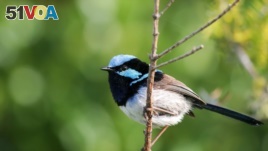12 August, 2018
Wild animals are known to listen to each other for warnings that predators are near. Some birds, for example, flee when neighbors make a loud noise to announce a snake's presence.
The fairy wren is a small Australian songbird. It is not born knowing the "languages" of other birds. But recent research says it can learn the meaning of a few important sounds.
Andrew Radford is a biologist at the University of Bristol in England and co-writer of the new report published in early August in the journal Current Biology.
He told the Associated Press, "We knew before that some animals can translate the meanings of other species' ‘foreign languages,' but we did not know how that ‘language learning' came about."
Birds have several ways of learning life skills. Some knowledge is genetically passed by their parents and some comes from direct experience with the world.
But Radford and other scientists are exploring a third kind of knowledge: information from peers.
Radford and researchers at the Australian National University carried out the study in the country's National Botanic Gardens in Canberra. They attached to their bodies specially-designed, sound-producing equipment called "tweeter speakers." They wanted to see if fairy wrens would react to sounds of other birds even if they could not see them.

This photo provided by Jessica McLachlan shows a fairy-wren. (Jessica McLachlan)
The scientists first played the birds two recorded sounds that they likely had never heard before. One was a warning cry of an allopatric chestnut-rumped thornbill, a bird not native to Australia. The other was a computer-generated bird sound called "buzz."
When the 16 fairy wrens in the study first heard the sounds, they had no special reaction.
The scientists then tried to train half the birds to recognize the thornbill's cry as a warning sound. They tried to train the other half of the birds to recognize the computer-generated "buzz" as a warning call.
They did so by playing the sounds in addition to other noises that the birds already knew as warnings. These included the fairy wrens' own threat call.
After three days, the scientists tested what the birds had learned — and their students passed the test.
The fairy wrens trained with the thornbill's cry, fled when they heard it. The group trained with the buzz, fled when they heard that sound. Neither group reacted to the sound taught to the other.
Twelve of the 16 birds fled every time the researchers played their given sound. The other four birds fled at two-thirds or more of the playbacks.
Christopher Templeton is a biologist at Pacific University in Forest Grove, Oregon who was not involved in the study.
"Until this study, we had limited knowledge about how an animal learns what calls from other species actually mean," Templeton said.
"What this new study does is remove the predator entirely. It shows that these birds can learn to associate new sounds with danger, without having to learn [them] through trial and error," he added.
Andrew Radford of the University of Bristol noted that the ability to learn to link sounds with meaning makes biological sense.
"If you can only learn in the presence of a predator, that's quite dangerous," he said.
I'm Pete Musto.
Christina Larson reported this story for the Associated Press. Pete Musto adapted it for VOA Learning English. Caty Weaver was the editor. We want to hear from you. What other animals do you think are able to learn other animals' "languages?" Write to us in the Comments Section or on 51VOA.COM.
________________________________________________________________
Words in This Story
predator(s) – n. an animal that lives by killing and eating other animals
snake – n. an animal that has a long, thin body and no arms or legs
journal – n. a magazine that reports on things of special interest to a particular group of people
translate – v. to change words from one language into another language
species – n. a group of animals or plants that are similar and can produce young animals or plants
peer(s) – n. a member of the same group as someone or something else
associate – v. to think of one person or thing when you think of another person or thing
quite – adv. to a very noticeable degree or extent